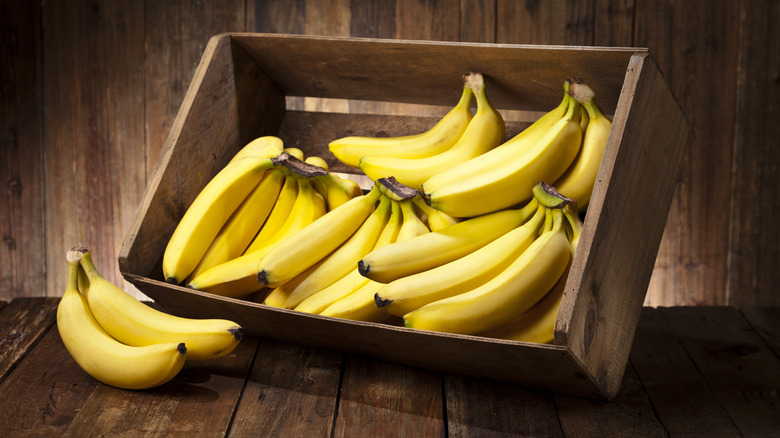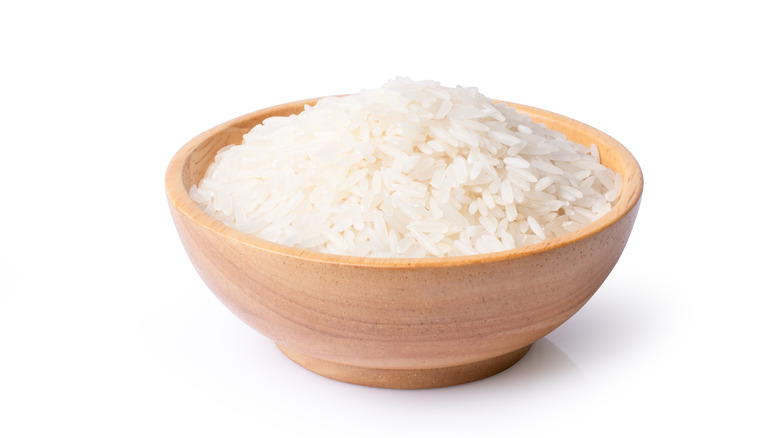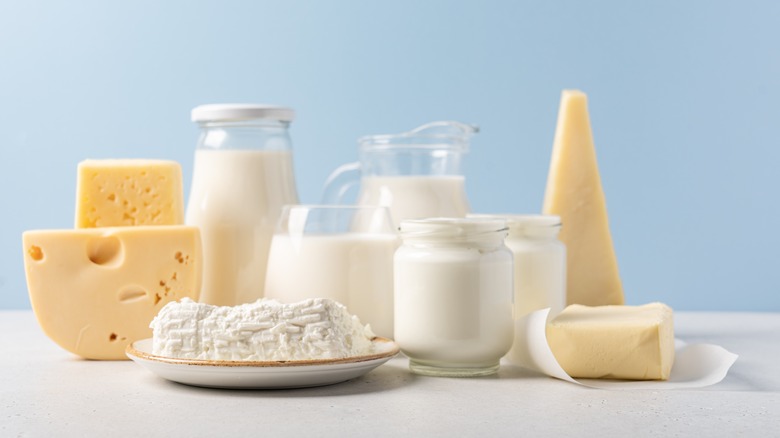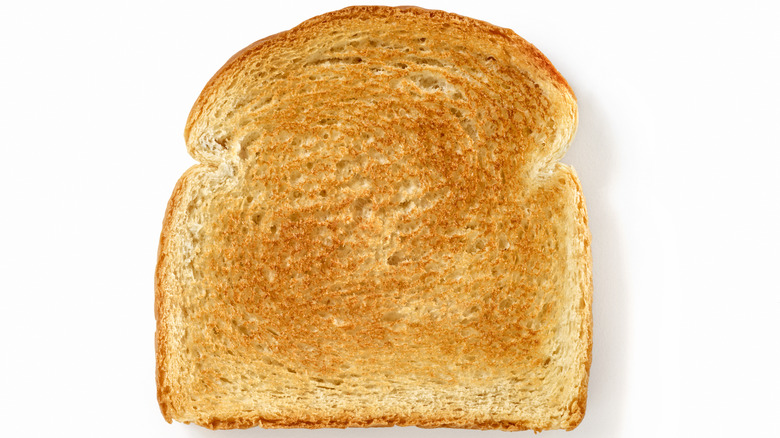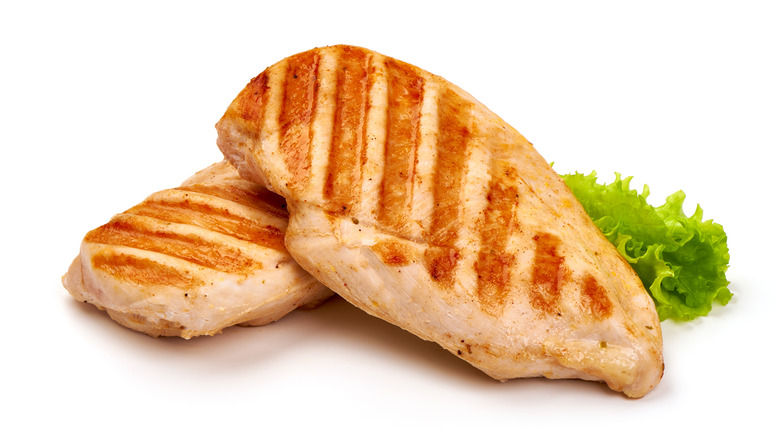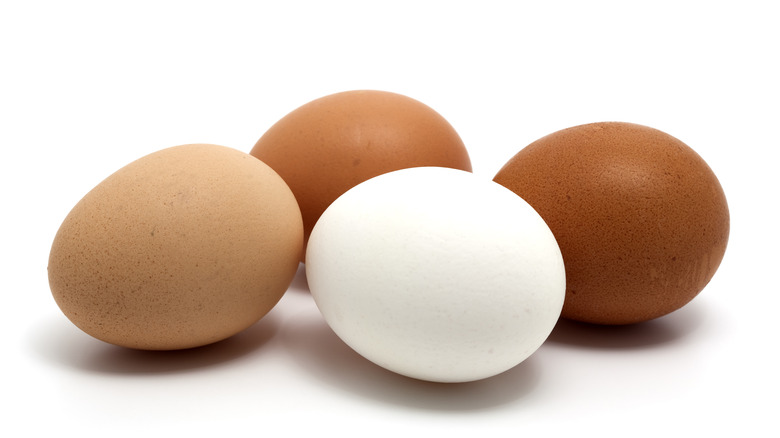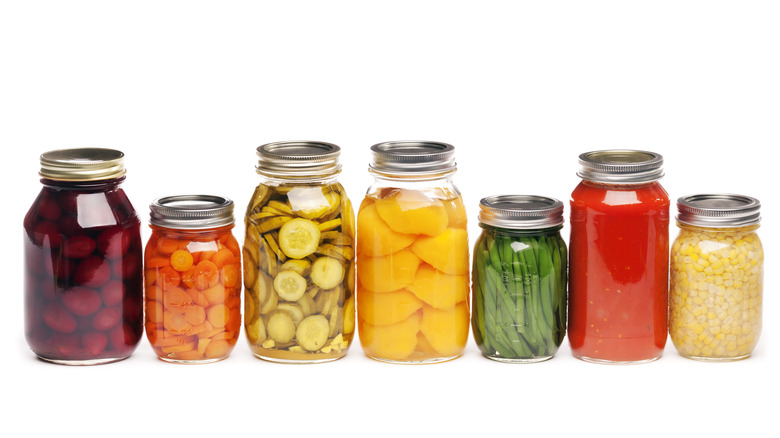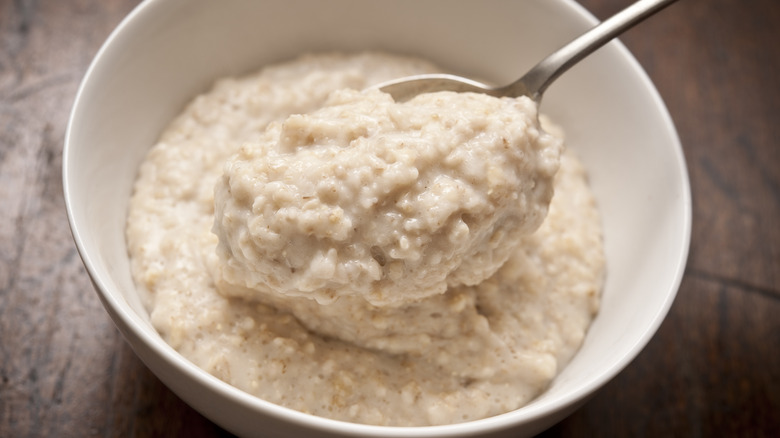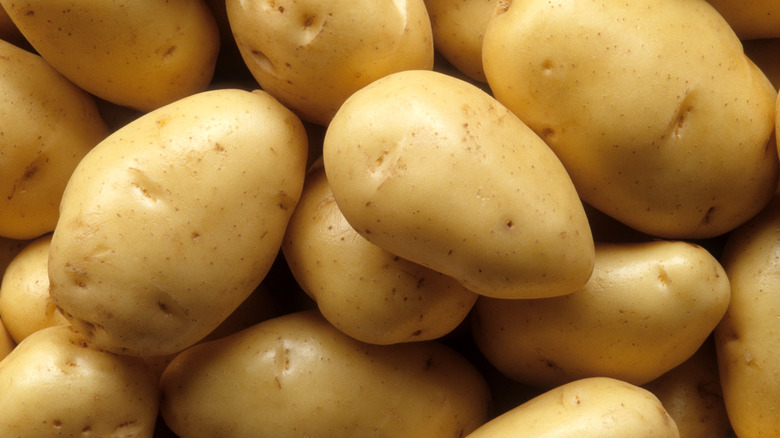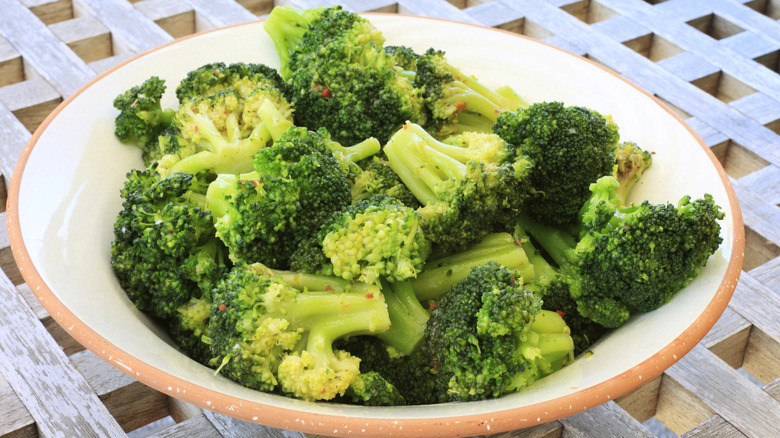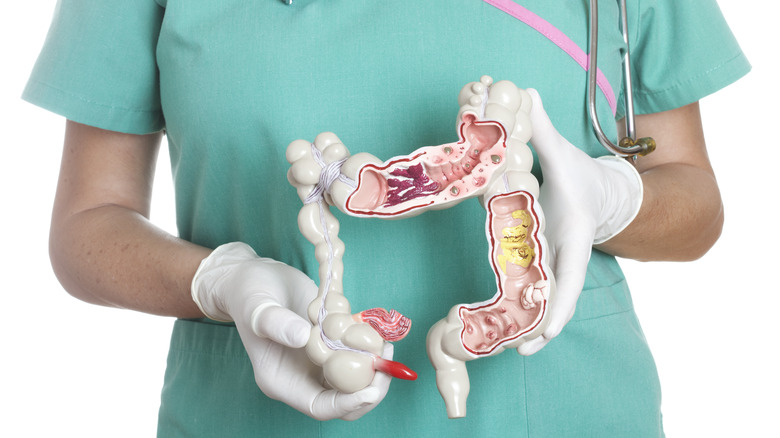12 Easy-To-Digest Foods To Consider Adding To Your Diet
Anyone who has ever had a stomach bug can tell you that eating is not always easy. Sometimes, you just need something soft and bland and gentle on the stomach, but it isn't always clear which foods will help and which will make your stomach hurt worse. Some usually "healthy" foods can actually make an upset stomach even more upset. But don't worry, we've got a list of foods that you can rely on for easy digestion.
Whether you are suffering from a short-term bout with a stomach virus, food poisoning, or indigestion, or a more long-term condition like GERD, gastritis, Irritable Bowel Syndrome (IBS), malabsorption, or other gastrointestinal issues, or even if you just overdid it with the tacos or the wine yesterday and need a little breather today, the foods on this list are a gentle way to get the energy and nutrients you need. We have consulted numerous authoritative medical sources to separate the wheat from the chaff (wheat's not easily digestible, by the way) and give you lots of options that will make it easier to eat when your stomach is being difficult.
Bananas
If you grew up in the United States, the first diet you ever heard of was most likely the B.R.A.T. diet. This easy-to-digest list of foods was once the top doctor recommendation when it came to stomach ailments like nausea, vomiting, and diarrhea — and not just for kids.
The first letter in this dietary acronym is B, which stands for bananas. Bananas not only go down easier than other fruits when your stomach is in crisis, but they can also help to replace the potassium and electrolytes that are lost when you have a bout of vomiting or diarrhea. Green bananas can also contain "resistant starch," which can help your digestive system to bounce back from your illness more quickly.
This is a caveat to this, however. Those with IBS are typically told to avoid foods that are high in FODMAPs, which is another lovely acronym that stands for fermentable oligosaccharides, disaccharides, monosaccharides, and polyols. These are a group of short-chain carbohydrates that can be difficult for some people to digest. Bananas fall into this category of foods ... but only in their ripe form. So, if you suffer from IBS, you should opt for greener, less ripe bananas, as the riper a banana gets, the higher the level of FODMAPS it contains and the harder it will be to digest.
White Rice
Second on the B.R.A.T. to-eat list is R, which stands for rice. White rice, that is. White rice is easy on the digestive system and is often recommended by doctors to help ease stomach upset, nausea, vomiting, and diarrhea. Rice is easy on the digestive system and the fiber it contains will help to stop or slow diarrhea by solidifying your stool.
Typically, dietitians recommend brown rice as a part of a healthy, balanced diet, but when your stomach is in knots and you can't hold much down, white rice is the rice you need in your life. White rice is a more processed form of brown rice, which means that its outer layer of bran has been removed. Without this extra bran to add more hard-to-digest fiber to the mix, white rice is easier to both eat and digest. Your body can break it down more easily, which can help to stabilize your system.
Those who have a gluten intolerance will also be happy to know that all rice is naturally gluten-free. This means that you can feel safe eating it even when your stomach is already irritated. In either case, white rice will work best in its bland form, so save the spices and other add-ins until you're feeling better.
Non-fat milk and cheese
Those who have been diagnosed with lactose intolerance will already know that dairy products can be difficult to digest. This is because the human body is not really designed to break down cow's milk. While most babies drink and digest milk with no issues when they are young, nearly 75 percent of people gradually stop producing the enzyme needed to digest it starting when they are between three and five years old.
That enzyme is called lactase, and its job is to break down lactose (with an "o") when we drink milk or eat certain kinds of cheese. However, a large number of people are unable to produce enough lactase to get the job done. This means that digestion of lactose ends up taking place in the large intestine instead of the small intestine where it is supposed to happen, and this leads to gas, bloating, abdominal pain, and sometimes diarrhea.
Not everyone has the same degree of intolerance to dairy, but if you are sick or your stomach is otherwise not doing well, it is best to avoid the full-fat versions of dairy products because they will be challenging to digest. Lactose-free milk and cheese have much lower levels of lactose and contain lactase, so the digestion process goes much more smoothly.
Toast
The last letter in the B.R.A.T. diet is T for toast. While you may want to get fancy and make some whole wheat toast, don't! If you want to settle your stomach, white bread made with refined white flour is the best choice. This type of bread is easier to digest from the get-go because the refining process removes some of the fiber that makes wheat bread harder to break down.
Once that white bread becomes toasted, it becomes even more beneficial to the body. In one study, it was found that eating toasted bread leads to lower blood glucose values in the consumer. Jess Cording, M.S., R.D., CDN, INHC, explains this is because while the bread is toasting, a chemical reaction takes place that changes the starches within the bread. As the water in the bread is released due to the high temperature within the toaster, the starches begin to break down. Since this breaking-down process has already started happening by the time we eat the bread, we are better able to digest it.
Plain toast may be best when your stomach is at its worst. But if you are feeling a little better and want a bit more flavor, adding a bit of easy-to-digest fruit jelly can be okay, since it's made with gelatin, another highly digestible food.
Chicken
Red meat is well-known for its pros and cons, but chicken is another story. As a part of a healthy diet, poultry has been associated with a reduced risk of diabetes, obesity, and cardiovascular diseases, and is easily accessible to most consumers.
That's all well and good when you're already feeling fit and fine, but what about when your stomach is on the fritz? Well, chicken's got your back there too. According to research, chicken has "highly digestible proteins" in addition to minerals and B vitamins, which makes it easier for your stomach to process than foods that come from plants.
Chicken also contains lower levels of collagen than other meats. Collagen makes things harder to digest, so this is another point in chicken's favor. It is also lower in fat while still being high in protein, which is good news for those recovering from an illness. You need protein to help your body rebuild, but the fat in some meats can be hard to digest, causing cramps and diarrhea.
Don't go reaching for the barbecue sauce just yet, though. In order to be easy on the stomach, chicken should be poached or baked.
Eggs
Eggs are pretty much a superfood. They are a complete protein, meaning that they have all nine of the amino acids we need to get from food in order for our body to function, and they contain vitamins and nutrients like B12 that contribute to a healthy brain and nerve system. They can improve eye, bone, and mental health as well.
Best of all, though, is that eggs are easy to digest. This means that, even if you can't keep much else down, eggs may be the friend your stomach is looking for. They can also help your body to absorb other important nutrients like vitamin E from the other ingredients in your dishes.
Boiled, scrambled, or poached eggs are recommended for those who are feeling nauseous or recovering from an illness. To make them even easier to digest, you can eat just the egg whites, which are easier for the body to break down because they contain less fat. When you feel a bit better, it might be best to add those yolks back in, though, because without them you might be missing out on some important post-sickness nutrients.
Cooked or canned fruit and vegetables
Typically, raw fruits and vegetables are considered to be the ideal diet foods. A salad with crisp lettuce, leafy spinach, and shredded carrots is great on a regular day, but if your digestive system is in distress, you shouldn't be reaching for the salad bowl, you should be reaching for a pot to cook in or a can of fruit or veggies from the pantry.
The raw, unprocessed forms of plant-based foods truly do have an important place in a balanced diet, but they tend to be hard to digest. Cooking them lowers the levels of insoluble fiber they contain, which makes them easier to break down, especially for people who have IBS or other chronic gastrointestinal issues.
Even beans, which are notoriously tough on the stomach, become easier to digest when they have been thoroughly cooked (although we still wouldn't recommend eating them when your stomach isn't quite at its peak performance). Cooking carrots also raises the amount of beta-carotene they contain, which is good for the body as well, and cooking things like tomatoes, kale, and even cabbage allows the body to absorb the vitamins and minerals they contain so much easier.
So, when you have an upset stomach, reach for canned or cooked fruits and vegetables. We recommend a timeless classic like applesauce, which also has a place in that famous B.R.A.T. diet.
Cream of Wheat
For those who aren't sensitive to gluten, Cream of Wheat is easy to digest. It is smooth, warm, and bland: Perfect for when you don't want to have to work to eat something. For those who haven't heard of it, Cream of Wheat is a porridge made from wheat middlings that have been processed and refined so that the outer layer of the grain is removed, as well as an interior layer. With those parts missing, Cream of Wheat is lower in fiber, which makes it easier on your digestive system.
Cream of Wheat is also a good addition to your diet because it contains beneficial vitamins and minerals that can not only help you to bounce back after an illness, but also be healthier in general. It may not have all the benefits of a whole grain breakfast, but it does have a lot of the things you need to get back up and running again.
Cream of Wheat on its own can be very bland, which, in the case of an illness recovery diet, is a good thing. But if you want to make it a bit easier to swallow, consider adding a bit of honey or cooked fruit for some additional flavor.
White bread or crackers
If you have ever been told to eat some plain saltine crackers when you're feeling nauseated, you are definitely not alone. These simple crackers seem to be one of the most widely recommended foods to help settle your stomach, but why is that? The answer is in the flour.
Both white crackers and white bread are easier to digest than their whole wheat counterparts because they are made with flour that has been more thoroughly processed. This processing removes the outer layer of bran from the grain used to make them, which saves your digestive system a bit of work. Since the bread and crackers have less bran, they have less fiber to slow down your system, making them a nice, gentle way to ease back into eating when you're not feeling your best.
Foods produced with white flour are often disparaged in the media because they are processed and not as "healthy" as their whole grain counterparts, but this is not a black and white issue. Whole grains are important for your regular diet, but when your digestive system is struggling, white bread and flour are a fantastic source of nutrients and are well-known for settling your stomach so that you can ease back into eating other things.
Potatoes
Is there any food more beloved than potatoes? It is hard to think of one. They are such a versatile, delicious addition to a diet that it is hard to see them as a "sick day food." But they are!
Any type of cooked potato is ideal for a gentle-on-the-stomach food regimen, meaning that whether you prefer yellow potatoes or white potatoes or Russet potatoes or even sweet potatoes, you can eat them when you're on the mend from a gastrointestinal episode. To take it a step further, though, these potatoes aren't just something you can eat, they are something you should eat when you're sick.
According to a recent study, potatoes have been associated with regulating digestion and with lessening inflammation in the body. This is great news for people with an inflammatory bowel condition, as they can enjoy a food they love while still taking it easy on their stomach. The only caveat here is that the benefits stop when you start frying your potatoes (fried things are not great for digestion) or adding toppings like bacon, spices, full-fat cheese or other dairy products, so save the loaded baked potato for when you're on your feet again and stick with boiled, baked, or mashed potatoes for now.
Yogurt
Wait a second, isn't yogurt a dairy product? And aren't dairy products a big no-no when you want something easy to digest? Well, yes and no. Yes, yogurt is a dairy product, but no, it isn't as hard to digest as full-fat milk or cheese. In fact, yogurt is usually even well-tolerated by people who are lactose intolerant.
According to research, this seemingly miraculous fact is due to the "good bacteria" that live in yogurt. The bacterial lactase, in particular, is able to survive the perilous conditions of the acidic stomach and is carried through to the small intestine, where the other bacterial cells from the yogurt slow down its trip through the digestive system. This lets the lactase, which not everyone produces naturally, break down the lactose before it hits the large intestine, which means no uncomfortable symptoms like gas, bloating, or diarrhea.
This effect was most noted with unflavored yogurts. It still happens with flavored yogurt, however, just to a lesser extent. Based on this information, it would most likely be best to go with plain yogurt when you're feeling your worst, and dipping your toe back into the flavored yogurts when you've recovered a bit more, just to be on the safe side.
What are some hard-to-digest foods?
A big part of recovering from gastrointestinal issues is finding easy-to-digest foods. Another part is avoiding hard-to-digest ones. Spinach, for instance, is very high in fiber and should be avoided when your tummy is giving you trouble. This effect is lessened with cooking, however, so canned or well-cooked spinach may be better tolerated. Acidic fruits and vegetables like lemons, oranges, and tomatoes should be avoided as well, as the acid they contain can irritate the stomach lining and cause heartburn or related issues. Whole grains, while also usually a big diet "yes," are a big "no" when you need to take it easy on your digestive system, because they contain too much fiber which is hard to digest.
Now for some of the more obvious foods to avoid: Beans, broccoli, cauliflower, and onions are notorious for being hard to digest. This is because they cause flatulence and lots of air in the abdomen, which makes for some real discomfort or even diarrhea, cramps, and other symptoms. Greasy and fried foods should be passed up as well, because they contain too much saturated fat, which is difficult for the body to process. Bland foods are usually the way to go when it comes to gastrointestinal recovery, so it's best to leave these more flavorful but more difficult foods for when you're feeling better.
Methodology
The nutritional information in this article was gathered by consulting reputable sources such as research papers, websites, and books compiled and shared by universities, medical schools, and other authoritative organizations.

